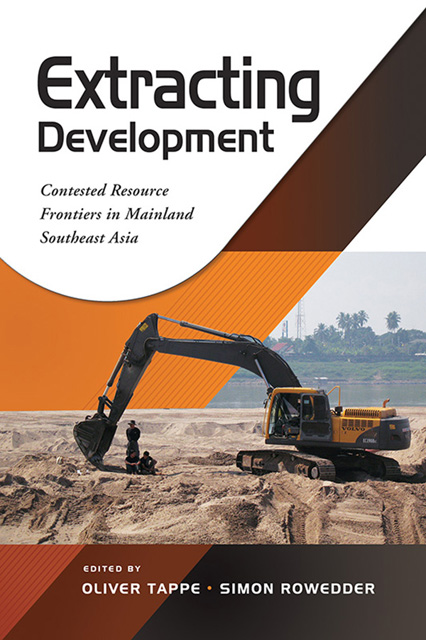Book contents
- Frontmatter
- Contents
- Acknowledgements
- The Contributors
- 1 Contested Resource Frontiers in Mainland Southeast Asia: An Introduction
- 2 Ontological Politics of the Resource Frontier: A Hydrosocial Analysis of the Mekong River in Northern Thailand
- 3 Reassembling Frontiers for Middle-Income Peasants: Rubber Expansion and Livelihood Ecosystem Transformation in a Northeast Thai Village
- 4 “Only the Best Fruits for China!”: Local Productions of a ‘Fruit Frontier’ in the Borderlands of China, Laos and Thailand
- 5 Commodity Frontiers in Motion: Tracing the Maize Boom across the Lao-Vietnamese Borderlands
- 6 New Frontier Spaces: Complex Entanglements and Power Relations (Re)shaping Land Governance in Laos
- 7 Moving Away from the Margins? How a Chinese Hydropower Project Made a Lao Community Modern and Comfortable
- 8 Frontier Capitalism in Colonial and Contemporary Laos: The Case of Tin Mining
- 9 Chinese Investments and Resource Frontiers in Cambodia: Systemic Transformation
- 10 The Open Issues: Cases between Chinese Investment Companies and Local People in Myanmar
- 11 Internationalization of RMB and Tin Ore Trade in China-Myanmar Frontier Governance: Views from Yunnan Province
- Index
8 - Frontier Capitalism in Colonial and Contemporary Laos: The Case of Tin Mining
Published online by Cambridge University Press: 30 June 2023
- Frontmatter
- Contents
- Acknowledgements
- The Contributors
- 1 Contested Resource Frontiers in Mainland Southeast Asia: An Introduction
- 2 Ontological Politics of the Resource Frontier: A Hydrosocial Analysis of the Mekong River in Northern Thailand
- 3 Reassembling Frontiers for Middle-Income Peasants: Rubber Expansion and Livelihood Ecosystem Transformation in a Northeast Thai Village
- 4 “Only the Best Fruits for China!”: Local Productions of a ‘Fruit Frontier’ in the Borderlands of China, Laos and Thailand
- 5 Commodity Frontiers in Motion: Tracing the Maize Boom across the Lao-Vietnamese Borderlands
- 6 New Frontier Spaces: Complex Entanglements and Power Relations (Re)shaping Land Governance in Laos
- 7 Moving Away from the Margins? How a Chinese Hydropower Project Made a Lao Community Modern and Comfortable
- 8 Frontier Capitalism in Colonial and Contemporary Laos: The Case of Tin Mining
- 9 Chinese Investments and Resource Frontiers in Cambodia: Systemic Transformation
- 10 The Open Issues: Cases between Chinese Investment Companies and Local People in Myanmar
- 11 Internationalization of RMB and Tin Ore Trade in China-Myanmar Frontier Governance: Views from Yunnan Province
- Index
Summary
INTRODUCTION
When France seized control of the Lao territories on the east bank of the Mekong from Siam in 1893, the sparsely populated country remained a colonial “backwater” that received only little administrative and commercial attention (Gunn 1990; Ivarsson 2008). However, as Laos was rich in minerals, not only gold and silver but also tin and copper, it evoked imaginaries of a “Klondike Indochinois and New Bolivia” (Deloncle [1930] 2011, p. 116) and attracted numerous entrepreneurs and venturers. Taking the tin mining area in the Nam Phathaen valley (Khammouane Province, central Laos; see Figures 8.1 and 8.2) as an example, this chapter investigates the contingent processes of (capitalist) frontierization—processes of uneven and combined development on the ground—in past and present Laos.
The image of a resource frontier has certainly shaped the perception of Laos until the present day. Still in the 2000s, the Asian Development Bank depicted the country as a “new frontier” (Barney 2009, p. 147) and promoted transnational investment into mining, energy and agribusiness, which was a striking echo of colonial discourses on underdeveloped and underpopulated Laos. Both under colonial capitalism and in the context of present-day “market socialism with neoliberal characteristics” (Hann and Endres 2018), the vast, forested uplands of Laos (80 per cent of the state territory with only half of the country's population of 7 million), in particular, have been envisaged as a resource-rich frontier awaiting exploitation. This imaginary translated into extractive practice that produced considerable social and environmental costs among the fifty different ethnic groups of Laos and their largely subsistence-based economies (see, e.g., Kenney-Lazar 2018; Rigg 2005; Laungaramsri 2012; Dwyer and Vongvisouk 2017; Ponce, this volume).
As several authors have noted (Tsing 2005; Li 2014; Cons and Eilenberg 2019), the concept of the (resource) frontier can be used as a heuristic device to examine the interwoven social, economic, political and environmental dynamics and transformations at the margins of global capitalism (see as well the introduction to this volume by Rowedder and Tappe). In particular, the relationship between global capital and indigenous communities, processes of exclusion, and increasing inequalities can be examined through the lens of the frontier. Shifts in local subsistence strategies and labour relations under conditions of frontier capitalism and rudimentary industrialization constitute a key aspect to be discussed in this chapter.
- Type
- Chapter
- Information
- Extracting DevelopmentContested Resource Frontiers in Mainland Southeast Asia, pp. 172 - 196Publisher: ISEAS–Yusof Ishak InstitutePrint publication year: 2022

